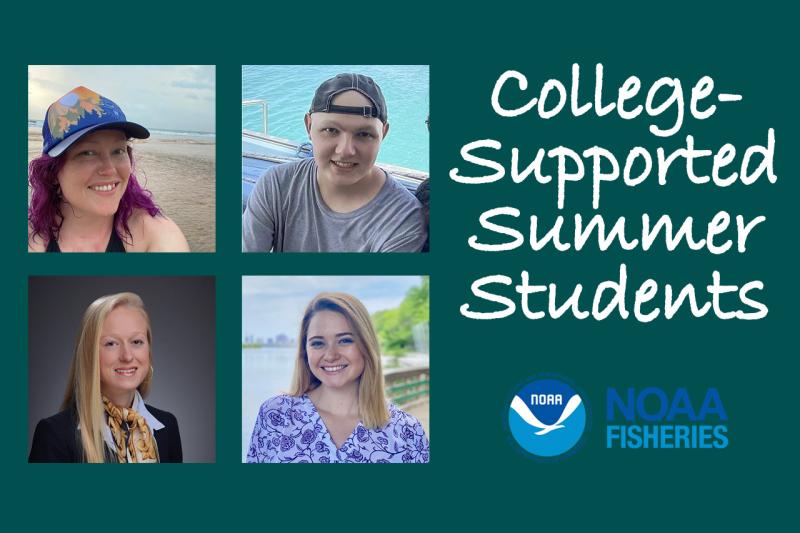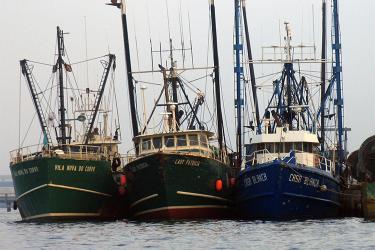Since 2006, NOAA has partnered with colleges to provide undergraduate students college-funded summer internship opportunities. Students enrolled in one of the partner colleges participate and apply through that college. NOAA also collaborates with other universities to offer internship opportunities to help them fulfill their degree requirements.
This year, our science center hosted four students from three states and four different colleges and universities. Projects focused on endangered species, coastal fish distribution, aquaculture gear as fish habitat, and oral histories.
In each profile, students outline their project, explain why it's important, and—always the most compelling part—share insights they’ve gained into marine science as a career during their time with us.
Taylor Coleman (She/Her/Hers)
Bio
Hometown: Charlotte, North Carolina
University: Duke University in Durham, North Carolina
Degree program: Master's program in Environmental Management in Coastal Environmental Management
Internship Mentor(s):
- Genevieve Davis, NOAA Fisheries Northeast Fisheries Science Center
- Julianne Wilder, NOAA Fisheries Northeast Fisheries Science Center
Project
I’ve been working with the science center’s passive acoustics group to evaluate passive acoustic data collected from 2020 to 2021 at a research site within Stellwagen Bank National Marine Sanctuary. I’ve been using the Low-frequency Detection Classification System developed by Mark Baumgartner at the Woods Hole Oceanographic Institution to help identify acoustic daily presence of endangered North Atlantic right whales. With the help of my two awesome mentors, my contribution will go toward updating the group's nifty Passive Acoustic Cetacean Map!
Insight
I’ve become well acquainted with the group's right whale detection protocols, the detection classification system, and the caution that must be exerted when scoring detections. I’ve really enjoyed learning from my mentors and exploring the soundscape of Stellwagen Bank National Marine Sanctuary. I look forward to leveraging this experience and newfound insight on the calling behavior of right whales to help me complete my graduate research looking at sound as a stressor for right whales in Cape Cod Bay! My favorite part of my internship was the opportunity to meet members of the passive acoustics group in person and spend a week working out of the Woods Hole lab. I cannot thank the group enough for everything!
Caroline Fleming (She/Her/Hers)
Bio
Hometown: Southbury, Connecticut
University: Boston University in Boston, Massachusetts
Degree program: Doctoral program in Biology and Urban Biogeoscience & Environmental Health
Internship Mentor(s):
- Kim Hyde, NOAA Fisheries Northeast Fisheries Science Center
- Scott Large, NOAA Fisheries Northeast Fisheries Science Center
- Laurel Smith, NOAA Fisheries Northeast Fisheries Science Center
Project
As a Boston University URBAN program student, I’m interested in tackling urban environmental challenges. For example, little is known about the environmental drivers and other water quality linkages that might affect the abundance and distribution of fish in coastal areas. Specifically, I’m interested in better understanding how water quality might be used to predict menhaden abundance in Narragansett Bay. I’ve been working with the Rhode Island Department of Environmental Management to use menhaden and water quality data to develop abundance prediction models in R, a statistical computing and graphics software.
Insight
During my time at the science center, I’ve been struck by the encouragement and collaboration between branches, projects, and teams. This experience has helped me navigate a world outside of academia and the narrow scope of my dissertation. It’s been rewarding to build time-series, big data, and computational skills. While my scientific journey has led me to explore the effects of environmental change on molecular, organismal, and community scales in ocean systems, this is the first time I have tackled complex real-world problems. It’s been very inspiring.
John Michael Jerrild (He/Him/His)
Bio
Hometown: Fairfield, Connecticut
University: Mitchell College in New London, Connecticut
Major: Marine Biology
Internship Mentor(s):
- Renee Mercaldo-Allen, NOAA Fisheries Northeast Fisheries Science Center
Project
For my internship with the Milford Lab’s GoPro aquaculture project, I've been reviewing underwater video footage collected on an oyster farm in 2019 and taking photo stills of colonizing marine organisms growing on the cages. We will use the photos to measure percent cover and species richness. I’ve also been assisting with a field study to collect black sea bass from cages on shellfish farms and near boulders on rock reefs in Long Island Sound. The goal is to compare the relative condition of fish found in oyster farm areas to fish living on natural rock reefs to assess the quality of these habitats for juvenile fish.
Insight
This internship has been a very rewarding experience. I’m happy to have helped lab staff with several projects this summer. I’ve learned how to collect, manage, and process fish for research, how to collect and process videos and images, and use spreadsheets. I also learned a lot about the importance of collaboration and communication with people in the scientific field. There’s a lot of careful organization and planning that goes into conducting research.
Samm Newton (She/Her/Hers)
Bio
Hometown: Freeport, Texas
University: University of Wisconsin in Madison, Wisconsin
Degree program: Doctoral program in the History of Science, Medicine, and Technology
Internship Mentor(s):
- Patricia Pinto da Silva, NOAA Fisheries Northeast Fisheries Science Center
Project
For my project, I’ve been working on content management of NOAA’s Voices Oral History Archive. I’ve been transcribing and writing summaries of audio interviews. I’m also making sure that the more than 2,000 online records are complete and have useful descriptive information for researchers. As an ocean historian who works with archives and oral histories frequently, I know how important it is to make data like this available and easily searchable.
Insight
Voices is an amazing resource for data on the lived experiences of those who work and live in coastal communities. From interviews with local fishers to members of the Stratton Commission, as well as with fascinating ocean scientists, managers, and engineers, I’m constantly impressed and surprised by the stories I get to listen to each day during my internship. It is one thing to use oral histories, it is another to learn about how to collect and archive them. I’ve learned a lot.
For more information, please contact Heather Soulen.







